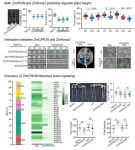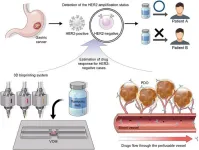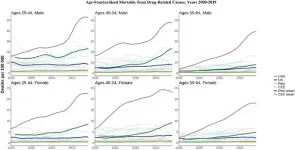The maize ZmCPK39-ZmKnox2 module regulates plant height
2024-03-21
(Press-News.org)
This study was led by Professor Mingliang Xu (College of Agronomy and Biotechnology, China Agricultural University, Beijing, China). Through phylogenic analysis, the authors identified a gene encoding a calcium-dependent protein kinase, ZmCPK39, as a candidate gene for plant height regulation in maize. The function of ZmCPK39 in controlling plant height has been verified using gene editing technology. Compared to the wild-type ND101, knockout of ZmCPK39 significantly reduced plant height by 40%.
The authors further identified a Knotted1-like homeobox protein, ZmKnox2, which interacts with ZmCPK39, using a yeast two-hybrid assay. The interaction between ZmCPK39 and ZmKnox2 has been validated by split-luciferase complementation and bimolecular fluorescence complementation assays. Importantly, the Mutator-induced ZmKnox2 mutant exhibited lower plant height than wild-type lines.
Through transcriptomic analysis, the authors found that the differentially expressed genes in both ZmCPK39 knockout lines and ZmKnox2 mutants were significantly enriched in photosynthesis and carbon metabolism pathways. Surprisingly, the authors observed that differentially expressed genes related to plant hormones were largely enriched in the ZmCPK39 knockout lines, but not in the ZmKnox2 mutants. Furthermore, most of these genes were involved in auxin signaling. Compared with the wild-type ND101, the ZmCPK39 knockout line had slightly lower IAA levels, while had significantly higher IAA derivative contents. In summary, this work highlights ZmCPK39 and ZmKnox2 as two potential targets for breeding dwarf or semi-dwarf varieties using genome editing technology.
See the article:
The maize ZmCPK39-ZmKnox2 module regulates plant height
https://link.springer.com/article/10.1007/s42994-024-00150-y
END
[Attachments] See images for this press release:


ELSE PRESS RELEASES FROM THIS DATE:
2024-03-21
Cellulose, abundantly available from plant biomass, can be converted into molecules used to make a new class of recyclable polymers, to sustainably replace some plastics.
Researchers at Hokkaido University have taken a significant step forward in the drive to make recyclable yet stable plastics from plant materials. This is a key requirement to reduce the burden of plastic pollution in the environment. They developed a convenient and versatile method to make a variety of polymers from chemicals derived from plant cellulose; crucially, these polymers can be fully recycled. The method was published in the journal ACS Macro Letters.
Cellulose is one of the most abundant ...
2024-03-21
Gastric cancer ranks among the most widespread diseases in Asian populations, with South Koreans experiencing the third-highest incidence globally in 2020, as reported by the International Agency for Research on Cancer. Recently, a collaborative research effort between Pohang University of Science and Technology (POSTECH) and Yonsei University achieved advancement in the realm of precision personalized medicine for gastric cancer. By using 3D bioprinting to accurately replicate the biological environment surrounding gastric cancer cells, the researchers have achieved a significant ...
2024-03-21
LA JOLLA, CA—Neuroscientists at Scripps Research have found that inhibiting neurons involved in the body’s stress response may reduce alcohol consumption in people who have both post-traumatic stress disorder (PTSD) and alcohol use disorder (AUD)—even if they still experience trauma-related anxiety.
The findings were published March 21 in Molecular Psychiatry. These discoveries are helping untangle the complex role that stress and trauma play in neurological disorders like PTSD and AUD, while also informing the development of new treatment options for people who experience both these conditions simultaneously.
“Traumatic ...
2024-03-21
Embargoed access to the paper and contact details for authors are available in Notes to Editors at the end of the release.
By 2050, over three-quarters (155 of 204) of countries will not have high enough fertility rates to sustain population size over time; this will increase to 97% of countries (198 of 204) by 2100.
Pronounced shifts in patterns of livebirths are also predicted, with the share of the world’s live births nearly doubling in low-income regions from 18% in 2021 to 35% in 2100; and sub-Saharan Africa accounting for one in every two children born on the planet by 2100.
In low-income settings with higher fertility rates, better access to contraceptives and female education ...
2024-03-21
The NHS needs an immediate cash injection of around £8.5bn a year over the next four years to make up a £32bn shortfall in funding and help tackle the current crisis, especially in areas such as waiting times, access to primary care, workforce and capital investment, say experts in the second report of The BMJ Commission on the Future of the NHS.
John Appleby and colleagues argue that, while the government’s recent spring budget funding pledges are a start, they “certainly will not make up the significant shortfall that the NHS ...
2024-03-21
Effective processes for reporting and responding to safeguard vulnerabilities are also lacking, warn experts
Many publicly accessible artificial intelligence (AI) assistants lack adequate safeguards to consistently prevent the mass generation of health disinformation across a broad range of topics, warn experts in The BMJ today.
They call for enhanced regulation, transparency, and routine auditing to help prevent advanced AI assistants from contributing to the generation of health disinformation.
Large language models (LLMs) are a form of generative AI that have the potential to greatly improve many aspects of society, including ...
2024-03-21
A new study by researchers at the Leverhulme Centre for Demographic Science (LCDS) and Princeton University reveals that US working-age adults are dying at higher rates than their peers in high-income countries; the UK is also falling behind. The study is published today in the International Journal of Epidemiology.
Using annual mortality data from the World Health Organization Mortality Database, the study compared trends in midlife mortality for adults aged 25-64 years between 1990 and 2019 across 15 major causes of death in 18 high-income countries, ...
2024-03-21
Making alcohol-free beer more widely available on draught in pubs and bars may help people switch from alcoholic to alcohol-free beer, a new study published in Addiction today [21 March], has found. Pubs and bars taking part in the University of Bristol-led trial saw an increase in sales of healthier non-alcoholic draught beer.
In partnership with Bristol City Council (BCC), researchers from the University’s Tobacco and Alcohol Research Group (TARG) recruited 14 pubs and bars across the city that were willing to change the drinks that they offered on draught for a limited period. Previous research by the same group, using an online experiment as a proxy for real-world behaviour, ...
2024-03-21
Around 32 per cent of the world's population live in countries that do not adhere to the World Health Organisation’s recommendations on safe limits of arsenic in drinking water
Rice is already known to contain more inorganic arsenic than other cereals
Cooking rice with water containing more than 10 µg L-1 (parts per billion) inorganic arsenic amplifies the risk of arsenic exposure
Long-term exposure to inorganic arsenic in water can cause serious health problems such as cancers, diabetes and pulmonary and cardiovascular diseases
Rice is one of the major cereal crops ...
2024-03-21
In a significant stride for respiratory medicine, Lundquist Institute (TLI) investigator Nicholas Jendzjowsky, PhD, has been awarded a prestigious grant from the National Institute of Health/National Institute of Allergy and Infectious Diseases (NIH/NIAID). This grant, totaling $298,800, not only underscores TLI's commitment to pioneering research and excellence in respiratory medicine and exercise physiology but also recognizes Dr. Jendzjowsky's expertise and the importance of his research.
The ...
LAST 30 PRESS RELEASES:
[Press-News.org] The maize ZmCPK39-ZmKnox2 module regulates plant height






